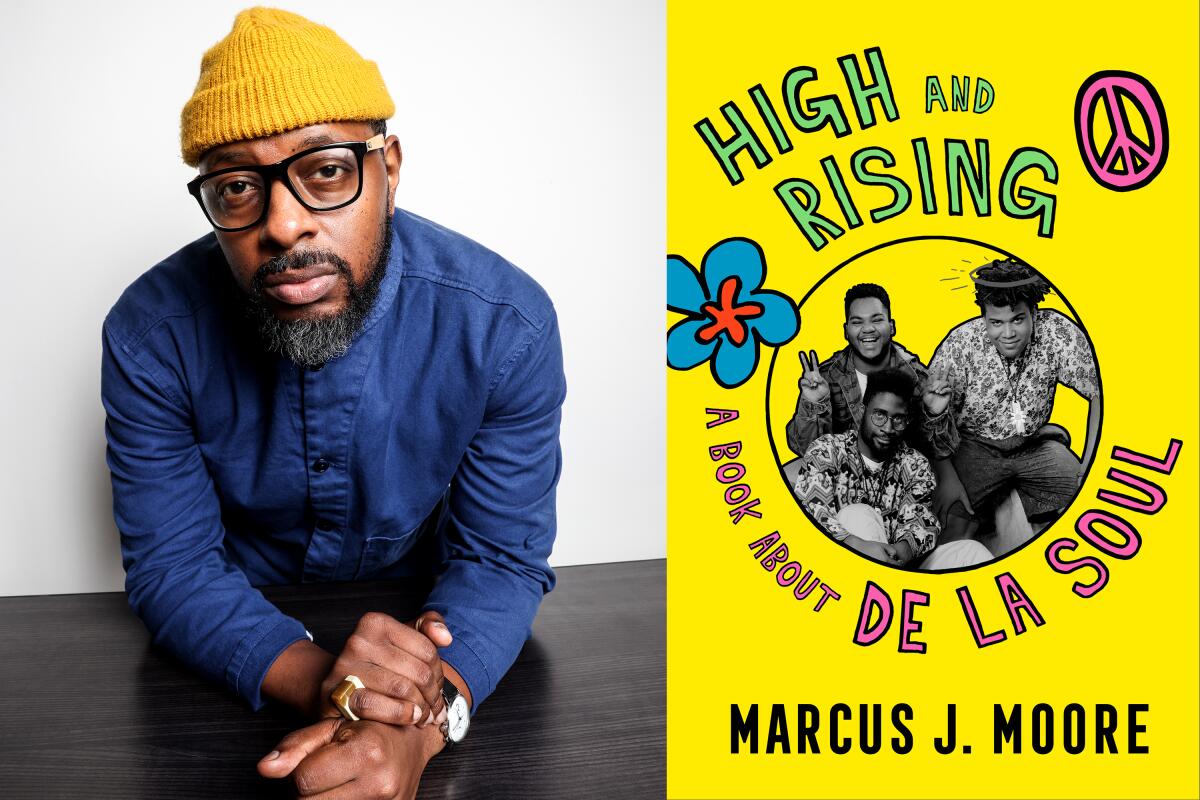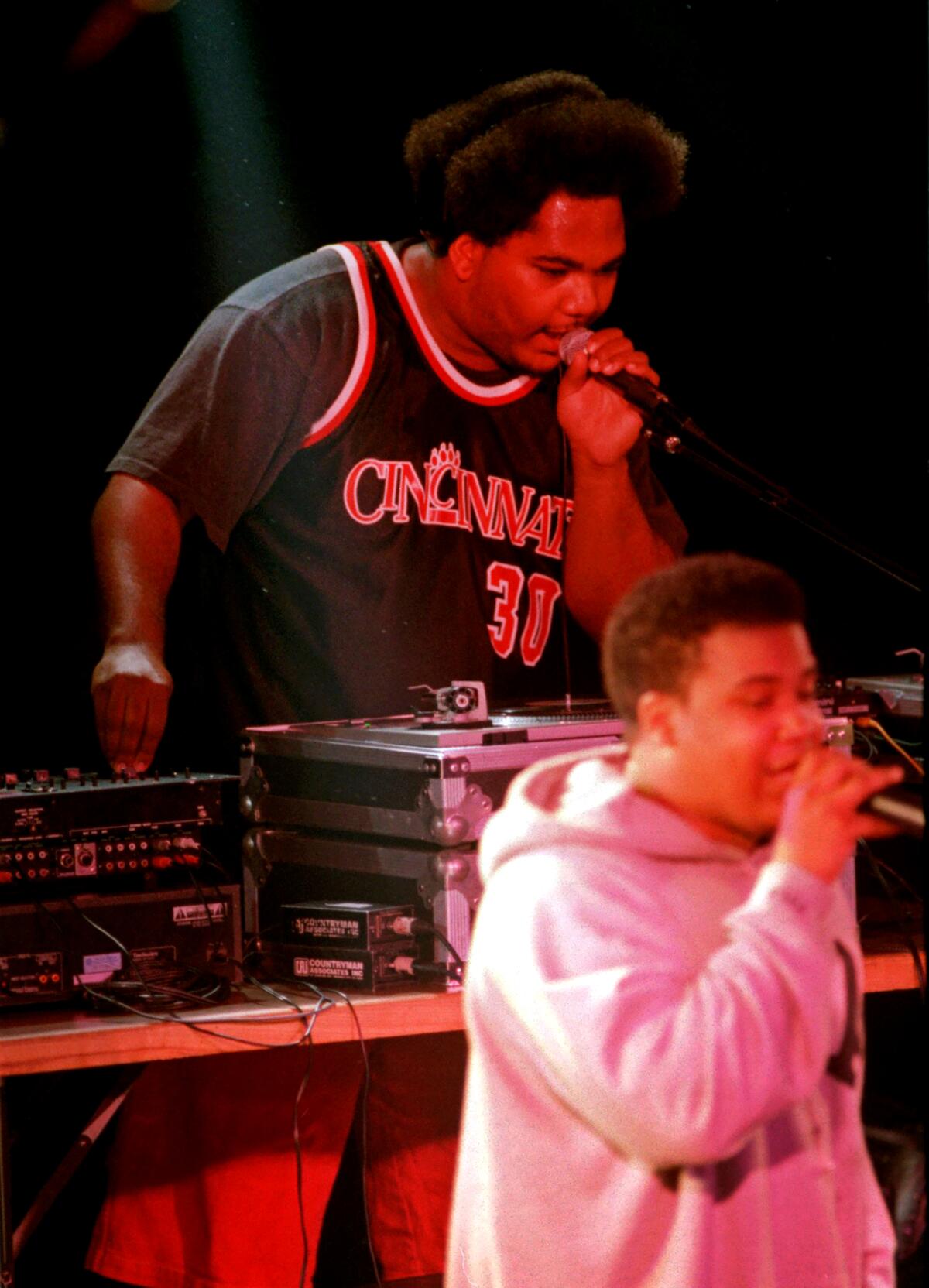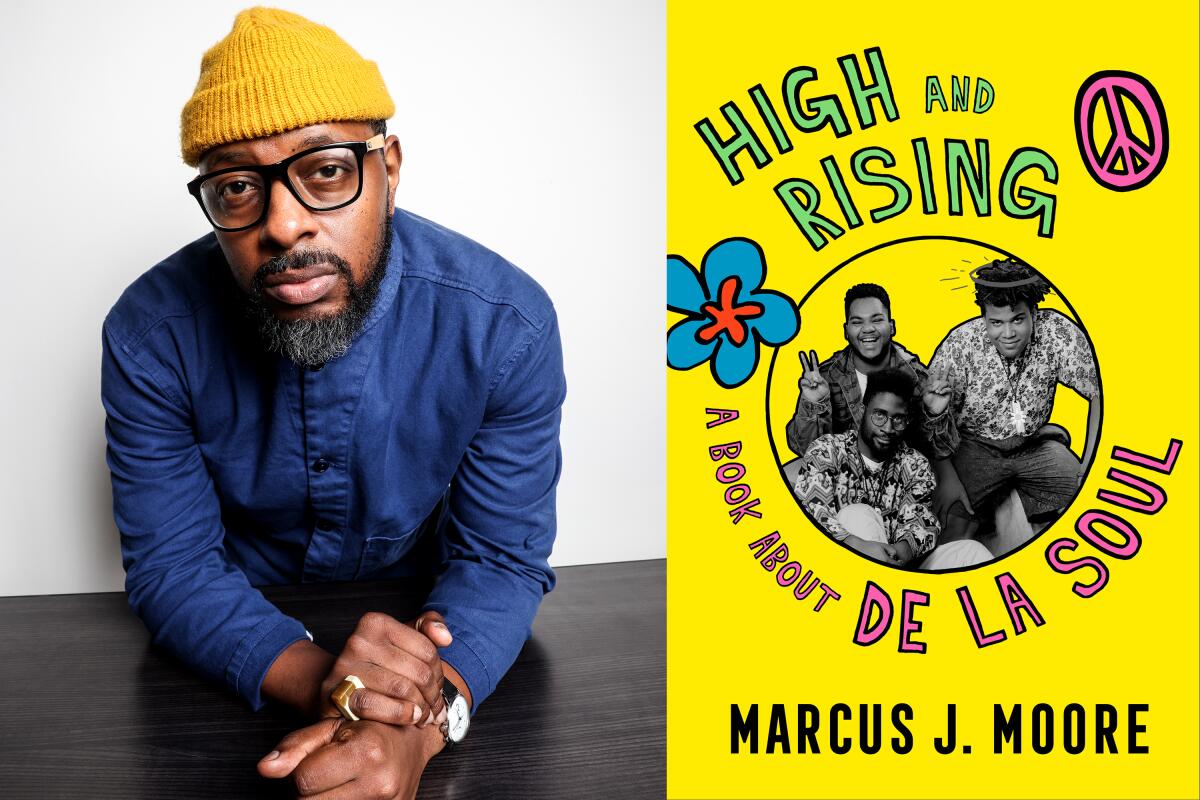Hello, fellow readers. Welcome to the L.A. Times Book Club newsletter.
Newsletter
You’re reading Book Club
An exclusive look at what we’re reading, book club events and our latest author interviews.
You may occasionally receive promotional content from the Los Angeles Times.
I’m culture critic and fervent bookworm Chris Vognar. This week we speak with Marcus J. Moore about his new book, “High and Rising,” which chronicles the career of the beloved rap group De La Soul, and the backlash it received from the very band it praised. We also look at recent releases reviewed by Times critics.
‘Unauthorized biographies’

Author Marcus J. Moore and the jacket cover of “High and Rising: A Book About De La Soul.”
(Jati Lindsay; Dey Street Books)
It’s great when a writer’s subject wants to participate in the process. But sometimes they don’t. That’s what happened with Marcus J. Moore, who was continually rebuffed when he sought De La Soul’s participation in “High and Rising.”
Moore chronicled the group’s transformation in his book anyway.
De La Soul’s 1989 debut “3 Feet High and Rising” hit like a joyous hip-hop sonic boom, mixing a crazy quilt of eclectic samples (thanks largely to producer Prince Paul) with a bohemian image that the trio proved eager to escape. Determined to show that the band members weren’t a bunch of hippies, De La Soul pivoted with its 1991 sophomore release, “De La Soul Is Dead,” which was deeply inventive but more low-key and dour. Even after dropping three classic albums following “3 Feet High” and other, more middling work, De La Soul has been, as Moore writes, “held captive by the music they made as teenagers.” First impressions are hard to shake.
Moore, whose De La Soul love comes through loud and clear in these pages, grapples with this legacy, as well as the record label drama and sampling clearance issues that kept De La’s music off of streaming platforms until 2023; and the death of group member David Jolicoeur the same year.
But De La Soul derided the book on social media after it was published, saying to its readers: “For years, you’ve stood with us in our fight for ownership of our catalog and the right to benefit from the music we created. That same dedication to protecting what’s ours extends to being the ones who tell OUR story—something deeply personal and “De La” to the core…”
My two cents: Sometimes, biographies in which the subjects refuse to participate are better than the authorized kind. When they’re done well, they break free of whatever spin a subject might wish to impose and adhere more closely to the author’s vision. As long as a book does not include lies and inaccuracies, fresh and original biographies can often result without a subject’s participation.
I spoke with Moore about the group, the book and the forceful reaction from his subject.
What makes “3 Feet High and Rising” stand out in the annals of hip-hop?
It was the first album that I could remember that had collage-like sampling. Back then you could pretty much guess that it was going to be the same electronic drum breaks that were going to be James Brown samples. You knew what you were going to get for the most part. Whereas with De La, you were hearing Hall & Oates, you’re hearing Steely Dan, you’re hearing Sly and the Family Stone. You’re hearing all these different musicians that were in your parents’ record collections, but you’re hearing it in this new and innovative way.
It was also happier than a lot of other records. Back then you had people like LL Cool J and Rakim who were going to rap at you. Chuck D was going to yell at you. They were dope, but I felt like De La Soul was talking to me. They spoke to wider groups of listeners, and not just Black listeners, which obviously would be good enough. They spoke to all kinds of people, whether you like rock or whether you like hip-hop. They talked to all of us.

New York rap group De La Soul performs at the Coach House in San Juan Capistrano in 1994.
(Alexander Garcia / Los Angeles Times)
They had this kind of flower child image, which was encouraged and to some extent manufactured by their record label, Tommy Boy. And it seems like they really came to resent it.
“3 Feet High and Rising” is the record that people want to talk about when it’s time to talk about De La Soul, or when it’s time to market De La Soul: Here come the flowers. People still want to hear “Me Myself and I” and “Say No Go.” But it’s got to be frustrating, because they’ve made so much music after that. I feel like when people look at De La Soul they still look at them as the 19-year-old kids. They’re in their 50s, damn near 60 now, but they’re still seen as the kids who are throwing flowers into the crowd.
You look at some of the group’s ups and downs, and you did a lot of reporting (the group declined to participate), but it is basically a pro-De La book. The group took to social media to attack the book, even saying they are “exploring all legal options.” What do you make of this?
It just sort of baffled me. It’d be one thing if I was writing a gossip tell-all-type book where I talked to a whole bunch of people who didn’t like them, and I wrote “The Real Story of De La Soul.” But it’s quite literally a love letter to a group that impacted so many different people. It was a positive book. It was also a shocking response because I have receipts to show that I had been trying to get in contact with them for four years. So for them to act like they were blindsided is disingenuous.
I definitely felt betrayed by the culture. It wasn’t just that response. It’s rappers who give me problems. It’s them who will show up 15 minutes late to the interview or not at all. They’re the ones who want all these crazy parameters on any interview or any sort of access. They feel like you’re supposed to genuflect to them and bend to their will at all times. So when I saw that reaction, I felt betrayed, but at the same time, I wasn’t surprised.
The Week(s) in Books
James Bartlett reports that the opening of the Last Book Store’s new Studio City location is right around the corner.
Lauren LeBlanc reviews Fabienne Josaphat’s novel “Kingdom of Tomorrow,” a story of late-1960s Black Panther members. As LeBlanc writes, the author “considers the risk and reward of revolutionary action during a time of heightened crisis and paranoia.”
Ilana Masad reviews Rémy Ngamije’s story collection “Only Stars Know the Meaning of Space.” Masad calls the book “a polyvocal collection that often emphasizes group dynamics and relationships over individuals.”
And Lorraine Berry looks at 18 books to give toddlers, young readers and teens for the holidays.
That’s all for now. Watch out for potholes in your lawn.
